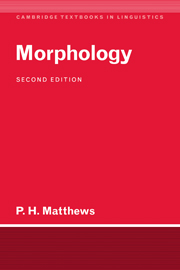Book contents
- Frontmatter
- Contents
- Preface to the first edition
- Preface to the second edition
- Principal references
- 1 What is morphology?
- 2 Word, word-form and lexeme
- 3 Inflections and word-formation
- 4 Lexical derivation
- 5 Compounds
- 6 Morphemes and allomorphs
- 7 Morphological processes
- 8 Morphophonemics
- 9 Properties and their exponents
- 10 Paradigms
- 11 Inflectional morphology and syntax
- 12 Iconicity
- Index
11 - Inflectional morphology and syntax
Published online by Cambridge University Press: 05 June 2012
- Frontmatter
- Contents
- Preface to the first edition
- Preface to the second edition
- Principal references
- 1 What is morphology?
- 2 Word, word-form and lexeme
- 3 Inflections and word-formation
- 4 Lexical derivation
- 5 Compounds
- 6 Morphemes and allomorphs
- 7 Morphological processes
- 8 Morphophonemics
- 9 Properties and their exponents
- 10 Paradigms
- 11 Inflectional morphology and syntax
- 12 Iconicity
- Index
Summary
Is there a universal distinction? The problem of isolating languages; problem of denning the word.
What are words? Words as the smallest unit of syntax; but syntax in turn denned by words. The word as a unit of phonology: accent, restrictions at word boundaries. Grammatical characteristics: words as minimal free forms; cohesiveness; fixed ordering of inflections; formations in general non-recursive. Coincidence of features that are logically independent.
Problems and discrepancies. What qualifications are needed? Case in Latin and Turkish. The word in French: spelling vs phonology; forms in C(ə): are they words or non-words? Clitics: in Latin; in English; and in French? Auxiliary Tenses: simple forms vs periphrastic.
‘Peut-on poser une definition universellement valable des domaines respectifs de la morphologie et de la syntaxe?’ (‘Can one define the fields of morphology and syntax in a way which will be valid universally?’) The question is the last of three proposed for discussion at the Sixth International Congress of Linguists, and the answers given by the participants are printed, with a survey and further interventions, in the proceedings. The congress took place in Paris at a time when travel was more difficult than now, and most people there were European. But according to one of the few participants from North America the answer was quite simply ‘No’. It is time to ask if we can offer any improvement on this answer, and whether, in general, the distinction is as straightforward as we have tended to assume.
- Type
- Chapter
- Information
- Morphology , pp. 206 - 222Publisher: Cambridge University PressPrint publication year: 1991



